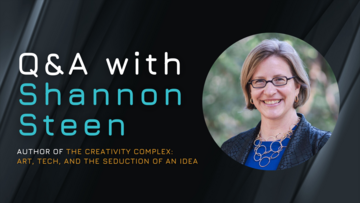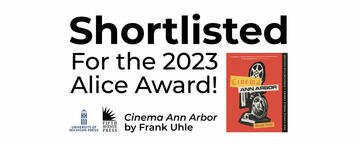Books to Celebrate Disability Pride Month, from the University of Michigan Press!
July is Disability Pride Month! Beginning with the passage of the Americans with Disabilities Act (ADA) in 1990, Disability Pride Month celebrates the identities and legacies of disabled people while also highlighting past and present prejudices and injustices towards them. The University of Michigan Press offers a variety of books to explore disability, including studies in areas such as the arts and history that make you question the very concept of “disability”, as well as interviews, poems, and memoirs from disabled people themselves. This month, we invite you to celebrate Disability Pride Month with our books on Disability Studies and books in our Corporealities: Discourses of Disability series. Here are some books to get you started:
Disability Aesthetics by Tobin Siebers
This book attempts to theorize the representation of disability in modern art and visual culture. It claims that the modern in art is perceived as disability, and that disability is evolving into an aesthetic value in itself. It argues that the essential arguments at the heart of the American culture wars in the late twentieth century involved the rejection of disability both by targeting certain artworks as "sick" and by characterizing these artworks as representative of a sick culture. It produces a new understanding of art vandalism, an argument about the centrality of wounded bodies to global communication, and a systematic reading of the use put to aesthetics to justify the oppression of disabled people.
Submissions for the annual Tobin Siebers Prize are now open! This prize is awarded in memory of author Tobin Siebers to books that best address an urgent topic in the field of Disability Studies. More information can be found in our blog post.
Mad at School: Rhetorics of Mental Disability and Academic Life by Margaret Price
Mental disability (more often called "mental illness") is a topic of fast-growing interest in all spheres of American culture, including popular, governmental, aesthetic, and academic. Mad at School is a close study of the ways that mental disabilities impact academic culture. Investigating spaces like classrooms, faculty meeting rooms, and job searches, Price challenges her readers to reconsider long-held values of academic life, including productivity, participation, security, and independence. Ultimately, she argues that academic discourse both produces and is produced by a tacitly privileged "able mind," and that U. S. higher education would benefit from practices that create a more accessible academic world.
Cheap Talk: Disability and the Politics of Communication by Joshua St. Pierre
Author Joshua St. Pierre flips the script on communication disability, positioning the unruly, disabled speaker at the center of analysis to challenge the belief that more communication is unquestionably good. Working with Gilles Deleuze’s suggestion that “[w]e don’t suffer these days from any lack of communication, but rather from all the forces making us say things when we’ve nothing much to say,” St. Pierre brings together the unlikely trio of the dysfluent speaker, the talking head, and the troll to show how speech is made cheap—and produced and repaired within human bodies—to meet the inhuman needs of capital. The book explores how technologies, like social media and the field of speech-language pathology, create smooth sites of contact that are exclusionary for disabled speakers and looks to the political possibilities of disabled voices to “de-face” the power of speech now entwined with capital.
Foucault and Feminist Philosophy of Disability by Shelley L. Tremain
By combining the work of Michel Foucault, the insights of philosophy of disability and feminist philosophy, and data derived from empirical research, Shelley L. Tremain compellingly argues that the conception of disability that currently predominates in the discipline of philosophy, according to which disability is a natural disadvantage or personal misfortune, is inextricably intertwined with the underrepresentation of disabled philosophers in the profession of philosophy. Tremain elaborates a new conception of disability as a historically specific and culturally relative apparatus of power.
Concerto for the Left Hand: Disability and the Defamiliar Body by Michael Davidson
Concerto for the Left Hand offers a wide range of essays that investigate the impact of disability across various art forms—including literature, performance, photography, and film. Rather than simply focusing on the ways in which disabled persons are portrayed, Michael Davidson explores how the experience of disability shapes the work of artists and why disability serves as a vital lens through which to interpret modern culture. Covering an eclectic range of topics—from the phantom missing limb in film noir to the poetry of American Sign Language—this collection delivers a unique and engaging assessment of the interplay between disability and aesthetics.
Blind in Early Modern Japan: Disability, Medicine, and Identity by Wei Yu Wayne Tan
While the loss of sight—whether in early modern Japan or now—may be understood as a disability, blind people in the Tokugawa period (1600–1868) could thrive because of disability. The blind of the era were prominent across a wide range of professions, and through a strong guild structure were able to exert contractual monopolies over certain trades. Blind in Early Modern Japan illustrates the breadth and depth of those occupations, the power and respect that accrued to the guild members, and the lasting legacy of the Tokugawa guilds into the current moment.
The Disabled Child: Memoirs of a Normal Future by Amanda Apgar
This book tracks the narratives that have emerged from the community of parent-memoirists who, since the 1980s, have written in resistance of their children’s exclusion from culture. The memoirs share a number of remarkable similarities; they are generally written by white, heterosexual, middle or upper-middle class, able bodied parents, depicting narratives in which the disabled child overcomes barriers to a normal childhood and adulthood. In the process of telling these stories, which recuperate their children as productive members of society, parental memoirists write their children into dominant cultural narratives about gender, race, and class. By reinforcing and buying into these norms, “special needs” parental memoirs reinforce ableism at the same time that they’re writing against it.
This book is available for free through Open Access.
War on Autism: On the Cultural Logic of Normative Violence by Anne McGuire
This book examines autism as a historically specific and powerladen cultural phenomenon that has much to teach about the social organization of a neoliberal western modernity. Anne McGuire discusses how in the field of autism advocacy, autism often appears as an abbreviation, its multiple meanings distilled to various “red flag” warnings in awareness campaigns, bulleted biomedical ”facts” in information pamphlets, or worrisome statistics in policy reports. She analyzes the relationships between these fragmentary enactments of autism and traces their continuities to reveal an underlying, powerful, and ubiquitous logic of violence that casts autism as a pathological threat that advocacy must work to eliminate. Such logic, McGuire contends, functions to delimit the role of the “good” autism advocate to one who is positioned “against” autism.
Seriously Mad: Mental Distress and the Broadway Musical by Aleksei Grinenko
Theatermakers in the United States have long been drawn to madness as a source of dramatic spectacle. During the Broadway musical’s “golden age,” creative teams used the currently in-vogue psychoanalytic ideas about mental life to construct troubled characters at odds with themselves and their worlds. As the clinical and cultural profile of madness transformed over the twentieth century, musicals continued to delve into the experience of those living with mental pain, trauma, and unhappiness.
This post was written by Neo Kanamori, a senior student at the University of Michigan. He is currently a History major and is also minoring in Linguistics.












